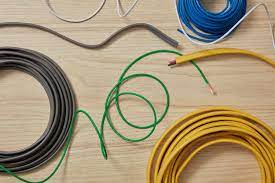Electrical wiring is the circulatory system of any building, carrying the lifeblood of electricity to power our modern lives. Whether you are building a new home or renovating an existing one, understanding the essential electrical wiring products is crucial. In this comprehensive guide, we will explore the fundamental components and products you need to ensure a safe and efficient electrical system.
- Cables and Wires
At the heart of any electrical system are cables and wires. They are the conduits through which electricity flows, connecting all electrical devices and appliances to the power source. The two primary types of electrical cables and wires are:
- Romex Cable (NM-B)
Romex cables are among the most common types of electrical wiring used in residential buildings. They consist of multiple insulated conductors housed within a non-metallic sheath, making them easy to install and suitable for interior wiring. Romex cables come in various gauges, with 14-2 and 12-2 being the most common for general household use.
- THHN/THWN Wire
THHN (Thermoplastic High Heat-resistant Nylon-coated) and THWN (Thermoplastic Heat and Water-resistant Nylon-coated) wires are single conductors primarily used in conduit wiring. They are well-suited for both indoor and outdoor applications due to their resistance to heat and moisture. THHN/THWN wires are color-coded for easy identification of their intended use.
- Electrical Boxes
Electrical boxes serve as protective enclosures for electrical connections, preventing exposure to live wires and minimizing the risk of fire hazards. There are various types of electrical boxes, including:
- Switch Boxes
Switch boxes house light switches and dimmers, providing a safe and organized space for controlling lighting fixtures.
- Outlet Boxes
Outlet boxes are designed for electrical outlets and receptacles, ensuring that your appliances and devices have a secure electrical connection.
- Junction Boxes
Junction boxes are used for wire splicing and branching, allowing multiple wires to be connected safely in a single location. They are crucial for maintaining a neat and organized electrical system.
- Outlets and Receptacles
Outlets and receptacles are where you connect your electrical devices and appliances to the wiring system. There are various types to choose from, including:
- Duplex Outlets
Duplex outlets, or standard electrical outlets, are the most common type found in homes. They allow you to plug in two devices simultaneously.
- GFCI Outlets
Ground Fault Circuit Interrupter (GFCI) outlets are essential in areas where water is present, such as kitchens, bathrooms, and outdoor spaces. They provide protection against electrical shock by quickly disconnecting the circuit if they detect a ground fault.
- AFCI Outlets
Arc Fault Circuit Interrupter (AFCI) outlets help prevent electrical fires by detecting and disconnecting circuits when they detect dangerous arcing conditions.
- Switches and Dimmers
Switches and dimmers are essential for controlling lighting and electrical fixtures. They come in various styles and configurations to suit your specific needs:
- Single-Pole Switches
Single-pole switches are used for controlling a single light or electrical device from one location.
- Double-Pole Switches
Double-pole switches are typically used for heavy-duty appliances that require a 240-volt circuit.
- Dimmer Switches
Dimmer switches allow you to adjust the brightness of lights, creating ambiance and saving energy.
- Circuit Breakers and Panels
Circuit breakers and electrical panels are your home's electrical control center. They protect your electrical system from overloads and short circuits. Key components include:
- Circuit Breakers
Circuit breakers are devices that automatically interrupt electrical circuits when they become overloaded or experience a short circuit. They come in various sizes and types, including standard, AFCI, and GFCI circuit breakers.
- Electrical Panels (Load Centers)
Electrical panels house the circuit breakers and serve as the central distribution point for electricity in your home. They are designed to be easily accessible for maintenance and safety.
- Conduit and Conduit Fittings
Conduit is a protective tube used to encase electrical wires in exposed or potentially hazardous locations. Conduit fittings ensure secure connections and proper bending of conduit. Common types of conduit include:
- PVC Conduit
Polyvinyl chloride (PVC) conduit is suitable for both indoor and outdoor installations. It is resistant to corrosion and moisture.
- EMT Conduit
Electrical metallic tubing (EMT) is lightweight and easy to work with, making it a popular choice for indoor applications.
- Rigid Metal Conduit (RMC)
RMC is the most durable type of conduit, used in high-risk areas where protection against physical damage is essential.
- Wire Connectors and Terminals
Wire connectors and terminals are crucial for secure and reliable electrical connections. Common types include:
- Wire Nuts
Wire nuts are used to join and insulate wires, ensuring they stay connected and safe.
- Wire Terminals
Wire terminals are crimped or soldered onto the end of wires for secure connections to devices and components.
- Tools and Accessories
To work with electrical wiring products, you'll need an assortment of tools and accessories, including wire strippers, pliers, screwdrivers, and electrical tape. These tools are essential for safely installing, maintaining, and troubleshooting your electrical system.
In conclusion, understanding the essential electrical wiring products is vital for anyone involved in electrical projects, from homeowners to professional electricians. These products form the foundation of a safe and efficient electrical system, ensuring that power flows reliably to all the devices and appliances that make our daily lives comfortable and convenient. When working with electricity, always prioritize safety and consult local building codes and regulations to ensure compliance with electrical standards.
Looking for quality electrical wires and cables in Vadodara? Your search ends here! We are your trusted source for all your electrical needs.


No comments yet